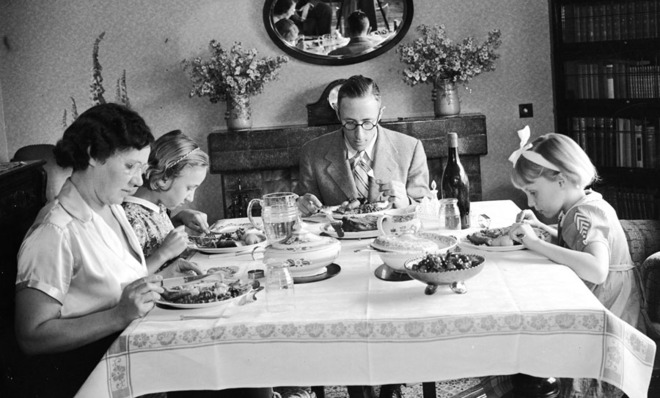In defense of family dinner
Let's not give up on home-cooked meals; let's just ditch the many factors that make them a pain


A free daily email with the biggest news stories of the day – and the best features from TheWeek.com
You are now subscribed
Your newsletter sign-up was successful
Family dinner is an intractable problem, one that many mothers have longed to get around for decades. After all, families need to eat dinner every night. And someone needs to make it.
Enter frozen dinners, Rachael Ray's 30 minute-meals, take-out, and other such shortcuts that have served as the silent heroes of women's liberation.
But in the last decade, the movement to return to simpler, less-processed foods has reestablished the pressure for parents (mostly mothers) to get back in the kitchen and slow simmer a stew. That many find this pressure to be a burden should come as no surprise.
The Week
Escape your echo chamber. Get the facts behind the news, plus analysis from multiple perspectives.

Sign up for The Week's Free Newsletters
From our morning news briefing to a weekly Good News Newsletter, get the best of The Week delivered directly to your inbox.
From our morning news briefing to a weekly Good News Newsletter, get the best of The Week delivered directly to your inbox.
A new study from researchers at North Carolina State University found that this burden often outweighs its benefits. For their report, "The Joy of Cooking?" Sarah Bowen, Sinikka Elliott, and Joslyn Brenton sat down to eat with 12 working-class families and interviewed 150 other moms from a variety of economic backgrounds. They came to the conclusion that dinner is no picnic.
"[Food reformers] fail to see all of the invisible labor that goes into planning, making, and coordinating family meals. Cooking is at times joyful, but it is also filled with time pressures, tradeoffs designed to save money, and the burden of pleasing others," they write.
They conclude by questioning "why the frontline in reforming the food system has to be in someone's kitchen" and why the responsibility to cook is most often on women. The solutions they suggest involve more communal approaches to churning out dinner, like healthy food trucks and take-home options made by school cafeterias.
Indeed, such options would be fantastic and help many families. But they aren't the solution here.
A free daily email with the biggest news stories of the day – and the best features from TheWeek.com
The problem isn't what is going on in someone's kitchen. What's really at fault is lingering sexism in the home and a workplace culture that doesn't support parents. Let's not give up on home-cooked meals; let's give up on the many factors that make them a pain.
A home-cooked meal need not be something that takes a lot of planning or effort, and it most certainly doesn't have to be executed by mom. We don't all have to mince locally-grown garlic and toss it over roasted organic Cauliflower and a free-range chicken on a nightly basis, as Michael Pollan suggests. A healthy, home-cooked meal could mean raw veggies served with hummus and pita, or steamed broccoli and quinoa made in a rice-cooker — my favorite time-saving device.
And the benefits of that family dinner are pretty clear. Studies show that families who eat together produce children who are physically and emotionally healthier, with a higher self-esteem and a lower risk of depression, substance abuse, and eating disorders. And no, the gains were not contingent on how arduous the meal-preparation was.
As some women in the report noted, cooking is also often cheaper than eating out, especially if the goal is to eat something healthy and not Taco Bell. Then there are the 15 million Americans with food allergies, for whom eating out is always a risk.
So the question isn't whether we should ditch home-cooked meals, but how we can give more parents the chance to prepare them. Part of the change has to happen inside of families. (Note to fathers and children: help out more and stop complaining about what is being served.)
But the other shift has to happen in our workplaces and our labor policies, by getting rid of unpredictable schedules (and often wages) and making sure parents have the flexibility they need. Because cooking for your children shouldn't be just another luxury enjoyed by the privileged few.
Elissa Strauss writes about the intersection of gender and culture for TheWeek.com. She also writes regularly for Elle.com and the Jewish Daily Forward, where she is a weekly columnist.
-
 The ‘ravenous’ demand for Cornish minerals
The ‘ravenous’ demand for Cornish mineralsUnder the Radar Growing need for critical minerals to power tech has intensified ‘appetite’ for lithium, which could be a ‘huge boon’ for local economy
-
 Why are election experts taking Trump’s midterm threats seriously?
Why are election experts taking Trump’s midterm threats seriously?IN THE SPOTLIGHT As the president muses about polling place deployments and a centralized electoral system aimed at one-party control, lawmakers are taking this administration at its word
-
 ‘Restaurateurs have become millionaires’
‘Restaurateurs have become millionaires’Instant Opinion Opinion, comment and editorials of the day
